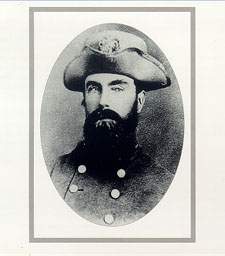| Maxcy Gregg |
| BACK |
 |
Maxcy Gregg
August 1, 1814 - December 15, 1862 Maxcy Gregg, born in 1814 in Columbia, S.C., was later educated at South Carolina College in Columbia. One of the Confedracy's most intelligent and cultured men, Gregg's diverse knowledge and interests included philosophy, Greek drama, astronomy, botany, and ornithology. After passing the bar, Gregg practiced law with his father in Columbia for many years except for the short time he served in the Mexican War. The prominent and influential bachelor was an avid secessionist and a member of South Carolina's secession convention. When his state withdrew from for Union, Gregg was instrumental in organizing the 1st South Carolina Volunteers. The regiment, under Colonel Gregg, included 27 physicians, 30 lawyers, and many prominent businessmen. Commissioned brigadier general on December 14, 1861, Gregg led the leading brigade of Gen. Ambrose P. Hill's Light Division in the Battle of Gaines's Mill on June 27, 1862. The advance of his five regiments was, according to Hill, "the handsomest charge in line I have seen during the War." But the Yankees were well positioned and over the course of the Seven Days' campaign, Gregg's regiments suffered 939 casualties. Gregg's military and leadership abilities were admired by many. "A regiment or brigade in his hands was a machine, where all parts worked together in thorough effeciency and smoothest harmony." At 2d Bull Run on August 29, 1862, Gregg and his men repulsed six assaults. The tenacious leader sent a message during the Union attack: "Tell Gen. Hill that my ammunition is exhausted, but that I will hold my position with bayonet!" That day resulted in 613 casualties among Gregg's troops. Two days later at Ox Hill, the Light Division drove back the Union soldiers in a driving rain. While held in a reserve position at Fredericksburg on December 13, Gregg's men were surprised by Gen. George B. Meade's Union troops as they charged through a disastrous gap in the Confederate line. Gregg was shot in the spine and suffered for two days before he died. Fascinating Fact: The scholarly lawyer-scientist had a private observatory at his home that was so well equipped it would have been coveted by many colleges. |
